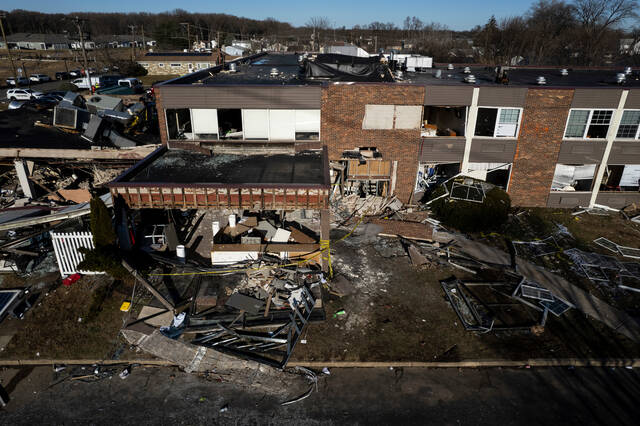Pennsylvania officials on Wednesday touted a milestone in covid-19 vaccinations based on federal data, though some experts have for months cast doubt on the veracity of those numbers.
Gov. Tom Wolf, using numbers from the Centers for Disease Control and Prevention, declared on Twitter and in a press release that 95% of all Pennsylvania adults have received at least one dose of a vaccine.
“The uplifting reality is that most people are doing what they can to protect their health,” Wolf said in a statement.
A spokesperson for the governor’s office said the data is based on the Centers for Disease Control and Prevention’s vaccine data tracker, which combines the state’s data, the Philadelphia health department’s data, and Pennsylvanians who were vaccinated out of state.
Dr. Howard Forman, a professor of public health at Yale University School of Medicine, questioned the federal data in an interview late last year with Kaiser Health News. He pointed to the fact that, per CDC data, 99.9% of all Americans aged 65 and up received at least one vaccine dose, something that didn’t line up with myriad polls, surveys and some states’ own data.
Since then, the CDC has added a footnote capping all vaccine data estimates at 95% to help “address potential overestimates of vaccination coverage due to first, second, and booster doses that were not linked.”
“I’m not sure how reliable the CDC numbers are,” Foreman told KHN, pointing to the discrepancy between state data and the agency’s 99.9% figure for seniors, which he said can’t be correct.
“You want to know the best data to plan and prepare and know where to put resources in place — particularly in places that are grossly undervaccinated,” Forman said.
Other experts told U.S. News and World Report that the CDC’s footnote capping estimates at 95% doesn’t do enough to solve the underlying data issues.
“We need to know where our vulnerable populations are,” said William Moss, the executive director of the International Vaccine Access Center at the Johns Hopkins Bloomberg School of Public Health. “We need to know where to divert resources. … With variations in data at the state level, it’s just very hard to do all that at the federal level or at the national level.”
Moss told the outlet that data reporting problems at the state level have plagued efforts to track numbers since the pandemic’s start, beginning with testing data and case counts.
The KHN report noted that getting accurate information regarding vaccination data is inherently difficult: federal and state officials might use different population estimates, states might not account for residents who are vaccinated in other states or those vaccinated in federal settings like prisons or clinics managed by the Veterans Health Administration of Indian Health Service.
The state Department of Health’s own vaccine data dashboard makes it difficult to determine that kind of age range because of the way it breaks down vaccinations by age, with 18- and 19-year-olds lumped with the 15-19 age group. Similarly, age breakdowns for older adults are broken into far narrower categories than the standard 65 and up.
It does note, in some breakdowns, that overall Pennsylvania data does not include out-of-state residents or data from the Philadelphia Department of Public Health, as Philadelphia’s vaccination efforts are overseen locally as opposed to by the state.
About 76.2% of Pennsylvania adults are fully vaccinated, according to state data. That percentage has crept slowly upward over the past month — roughly 0.1% each week.
Locally, about 83.5% of all Allegheny County residents have received at least one dose of a vaccine.
Covid-19 cases continued to fall last week in Allegheny County, and the latest data shows that deaths might also be beginning to trend downward.
From Feb. 14 through Sunday, 31 covid-related deaths were reported to the county health department, down from 66 the week before. Deaths reported to the department have fallen each week since mid-January.
The decline in deaths falls in line with the drop in covid-19 cases in the county, as deaths take a week or two to catch up to case counts.
Hospitalizations also have dropped each week since peaking at about 500 the week of Jan. 9.
The county saw a dramatic drop in case counts from the more than 10,000 cases in the last week of January to about 3,850 in the first week of February. From Feb. 6 to 13, the county recorded 2,105 cases, a drop of around 45%.
Cases also have dropped in Westmoreland County, from 3,207 cases the week of Jan. 23-29 to 1,544 cases the following week and 1,001 cases from Feb. 6-13.
The drops are mirrored across the state. From Feb. 14 to Sunday, the state Department of Health recorded an average of 2,608 cases per day. That’s half the daily average of 5,487 cases the week prior.
Study: Covid deaths among vaccinated largely among elderly, immunocompromised
Allegheny Health Network this week released data that officials said showed a majority of post-vaccination covid-19 deaths involved older, immunocompromised adults.
Of 473 in-patients who tested positive for the virus over six weeks in July and August, 128 were fully vaccinated, according to the study, which was published in the Infectious Diseases Society of America medical journal called Open Forum Infectious Diseases.
Of the 128 fully vaccinated covid patients, 93 were symptomatic. The average age of the 93 symptomatic patients was 73, and just over half were considered obese by body-mass index standards. All had at least one comorbidity.
About two-thirds of symptomatic patients required intensive care, and 19 fully vaccinated patients died from the virus. No one under the age of 50 died or required a ventilator, the study noted.
Though the data comes from a six-week period last summer before booster shots became widely available, authors of the study said the analysis shows that while some people remain vulnerable despite the shot, the vaccine is widely effective.
“Our experience at AHN underscores that while the vaccines are extremely effective in preventing hospitalization and death, some people are at risk despite being fully vaccinated, especially those who are medically vulnerable,” AHN infectious disease specialist Dr. Matthew Moffa said.
“Getting fully vaccinated and boosted, nevertheless, is still the most important thing anyone can do to avoid getting sick or severely ill with covid-19, and to help prevent the spread of the virus to other vulnerable people,” Moffa said.








